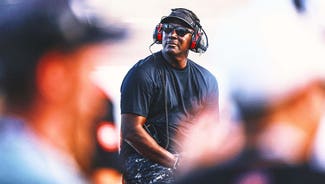
Petty has no time to waste
You don't win 200 NASCAR Cup races without taking a few chances.
And you don't win a record seven Cup championships without being a bit of a gambler.
But Richard Petty might be taking one of the biggest risks of his career this year as his Richard Petty Motorsports team merges with Yates Racing and switches from Dodge to Ford.
Either the move pays big dividends, allowing RPM to close the gap on the sport's top teams and become a strong multi-car organization, or it could all fall apart, leaving the operation in jeopardy and Petty looking for yet another team to attach his famous name to.
Petty became part owner of the George Gillett-owned organization when his storied Petty Enterprises folded prior to last season.
Now Petty is part of another organization that seems to be in a constant state of flux. And though RPM is in much better shape than Petty Enterprises was near the end, this is a critical season for the organization.
Though it won two races last season and put its star driver, Kasey Kahne, in the Chase for the Sprint Cup, RPM needs to show significant progress to remain a viable organization and a legitimate contender. If not, it could lose its biggest asset: Kahne.
The contracts for all four RPM drivers — Kahne, AJ Allmendinger, Elliott Sadler and Paul Menard (who drove for Yates last year) — are up after this season, and Kahne said last year that he is likely to leave if the organization does not show major improvement.
Kahne, who has 11 career victories, enters this season as one of the sport's top potential free agents and will no doubt get serious attention from several teams. And he could take his lucrative Budweiser sponsorship with him.
If RPM doesn't make the Yates/Ford deal work, leading Kahne to multiple victories and proving that he can be a serious championship contender right where he is, he will likely bolt.
That would leave Petty and RPM without a star driver and with dismal prospects of landing another one.
Petty knows what it's like trying to build an organization around mediocre or underachieving drivers. He went through a slew of them at Petty Enterprises and made little headway both in attracting sponsors and improving the team.
RPM may also have a potential star in Allmendinger, who has shown promise the past two years despite driving for teams struggling to compete or find sponsorship.
The loss of Kahne would be huge, while the loss of Allmendinger would leave the team without a driver to build its future around.
Without Kahne, who started his Cup career with the organization when it was owned by Ray Evernham, RPM is a midpack team struggling to survive instead of a promising team knocking on the door of the elite.
That's why the Yates merger is so crucial; The future of RPM, and of Petty as a car owner, hangs in the balance.
At first glance, it looks as if RPM is taking a step down. It is merging with a Yates operation it outran last year and that barely survived. The team formerly owned and led by legendary team owner Robert Yates has run mostly unsponsored the past two seasons and has only one driver, Paul Menard, remaining from its reorganization two years ago. How could such a merger possibly benefit a team that won two races and made the Chase last year?
Because Yates has two huge assets: Its alliance with powerful Roush Fenway Racing and serious horsepower from Roush Yates Engines.
RPM struggled with Dodge the last two years, and was getting dwindling support from the beleaguered automaker. The switch to Ford should produce better cars and engines through the affiliation with Roush and Yates.
But perhaps even more important could be Yates' affiliation with Roush.
Roush has won 56 races and two Cup championships since 2003 and posed a serious threat to Hendrick Motorsports until the offseason last year. If it supplies cars to RPM, details of the merger are expected to be announced Jan. 19. Then RPM figures to have better vehicles than it has had in the past.
Another bonus could be information sharing with the Roush teams and such accomplished drivers as Matt Kenseth, Greg Biffle and Carl Edwards. Kahne has already tested a Ford with a Biffle setup and seemed pleased with the results.
So far, the RPM drivers seem pleased and optimistic about the merger, which is a step in the right direction for an organization that seemed to have numerous disgruntled employees last year.
"It's actually looking good," says Kahne, who had been highly critical of the constant changes at RPM the past two years. "It has been a pretty crazy offseason trying to get the cars built, trying to get familiar with the new surroundings. But, you know, I'm really looking forward to it.
"I think we're going to have a better engine package. Working with a bigger group of people should benefit everybody at RPM. We have a neat team. I think we can do a really good job this year."
They better. The future of the organization may well depend on it.

